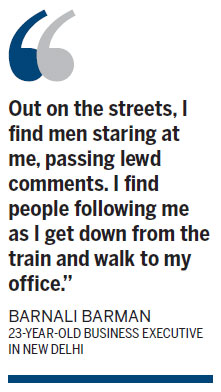Despite new laws for women, brutal sexism still endures
The phones were ringing nonstop in the tiny, windowless office in downtown New Delhi, with urgent appeals from desperate women.
One caller, speaking in whispers, said her husband beat her regularly because she failed to bring in enough dowry. Another woman said her teenage daughter was being stalked by a neighbor and needed legal advice.
Established in the wake of the gang rape and murder of a young New Delhi woman in 2012, the government hotline is part of a wave of change since the case forced the country to confront its appalling treatment of women.
The victim, a 23-year-old physiotherapy student, was heading home with a male friend after an evening showing of the movie Life of Pi when six men lured them onto a private bus. With no one else in sight, they beat the man with a metal bar and raped the woman.
The pair were dumped naked on the roadside, and the woman died two weeks later.
Indian media named her Nirbhaya, or "fearless", as rape victims cannot be identified under Indian law. She became a rallying cry for tens of thousands protesting the treatment of women.
Generations of sexism
There has been a surge in the number of rapes being reported. Between January and October 2013, 1,330 rapes were reported in Delhi and its suburbs, compared with 706 for the whole of 2012, according to government figures.
New laws have made stalking, voyeurism and sexual harassment a crime. There is now a fast-track court for rape cases. In some ways, the Nirbhaya case cracked a cultural taboo surrounding discussion of sexual violence in a country where rape is often viewed as a woman's personal shame to bear.
But for so many women in India's urban centers like New Delhi and Mumbai, the new laws have not made the streets any safer. And in such a conservative country, with powerful patriarchal traditions, it will take more than just one year to erode generations of devastating sexism.
"Out on the streets, I find men staring at me, passing lewd comments," said Barnali Barman, a 23-year-old business executive in New Delhi. "I find people following me as I get down from the train and walk to my office."
Nirbhaya's father said he takes comfort in the changes his daughter's suffering have brought.
But, he said, "Not a day passes when we don't shed tears."
"Our tears are not for her death, but for what she suffered," he said in an interview from the family's three-room apartment in the outer suburbs of New Delhi.

"We just can't forget how she suffered at the hands of these men," he added, his voice thickening. On the wall hung a faded piece of cloth - an award for bravery given posthumously to his daughter.
His wife, a pale shadow, backs out of the room at any mention of her daughter.
The assailants were tried relatively quickly in a country where sexual assault cases often languish for years. Four defendants were sentenced to death. Another apparently hanged himself in prison, though his family insists he was killed. And an 18-year-old who was a juvenile at the time of the attack was sentenced to three years in a reform home.
In India, the arrival of a daughter is a tragic event in many families. Illegal sex-selective abortions over decades have left the country with a ratio of 914 girls under age 6 for every 1,000 boys. Girls get less medical care and less education.
Still, in the last two decades as the Indian economy boomed, rising education levels and inflation have led to larger numbers of women joining the work force. But the deep-rooted social attitudes toward women have remained largely unchanged.
The result is that women's complaints of rape and sexual abuse remain drastically underreported. Families often do not make a police complaint to avoid the stigma that befalls the victim and her family.
"The criminals know that the Indian police and courts will take 10 years or more to prosecute them," said Tanpreet Singh, a 26-year-old New Delhi businessman. "The system is corrupt and many succeed in bribing their way out."
in New Delhi
(China Daily 01/24/2014 page12)














